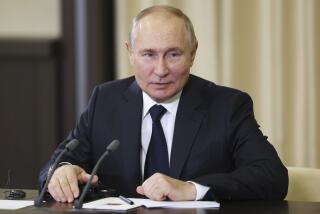Soviets May Help China on Science and Technology
- Share via
PEKING — The Soviet Union will open special new offices in Peking to provide help to China on economic matters and on science and technology, according to diplomatic sources here.
The agreement for the new Soviet presence was reached this week during a visit by Soviet First Deputy Premier Ivan V. Arkhipov, the sources said. The plans have not yet been officially announced, but may be unveiled when Arkhipov concludes his trip on Friday.
Establishment of the offices will mark another step forward in the efforts by China and the Soviet Union to rebuild some of the economic ties that were severed a quarter-century ago. In 1960, Soviet leader Nikita S. Khrushchev pulled all Soviet advisers out of China, leaving half-finished dams and roofless factories in their wake. The new accord also provides a further indication of China’s eagerness to avoid overly close political identification or economic links with the United States and Japan. Over the last two years, China has been stressing its desire to maintain cordial relations with both the United States and the Soviet Union but to avoid a strategic relationship with either of the two superpowers.
Chinese officials have repeatedly maintained that the changes in Sino-Soviet relations are confined to the economic sphere. They have said that political ties cannot improve until the Soviet Union withdraws troops from the Chinese borders, withdraws from Afghanistan and stops supporting Vietnam’s occupation of Cambodia.
But one Eastern European diplomat said this week that he believes the new economic links do reflect a degree of progress in Sino-Soviet relations.
“The Chinese like to say that there has been no improvement in the political relationship. That’s only partially true,” this official said. “These things could not be happening without some progress on the political front.”
Trade between China and the Soviet Union increased by a remarkable 60% last year, to a level estimated at approximately $2 billion. That figure remains far behind the level of China’s trade with the United States, which was $8 billion in 1985, or with Japan, which was $19 billion. But China’s trade with the Soviets last year was nearly the same as its trade with West Germany and was greater than it had with any other European nation.
Offices to Be Small
The new offices for economic affairs and for science and technology will be located outside the Soviet Embassy and will not be formally attached to it. They will be relatively small--in part because the Soviet Union will have to compete with Western companies for Peking housing and office space, which is expensive and in short supply.
Arkhipov, who was the Soviet Union’s top economic adviser to China during the 1950s, came to Peking last week for the first meeting of a group called the Sino-Soviet Commission on Economic, Trade, Scientific and Technological Cooperation. The group was set up after Arkhipov visited in December, 1984.
One Western diplomat said he thinks the new Soviet offices will handle “the nuts and bolts” of exchanges between China and the Soviet Union. “They’re going to have to have some kind of permanent mechanism for developing contacts, coordinating economic plans and so forth,” he said.
Earlier this year, China seemed to be adopting a tougher new line on the Soviet Union, after a hastily arranged and apparently unsuccessful meeting in Moscow between Soviet leader Mikhail S. Gorbachev and Chinese Vice Premier Li Peng.
Summit Suggested
According to diplomats here, Gorbachev urged that the Chinese and Soviet Communist parties begin taking at least some steps towards re-establishing party-to-party relations. He also reportedly broached the idea of a Sino-Soviet summit meeting.
China rebuffed both of these overtures and has also delayed setting a date for a planned meeting between the foreign ministers of the two countries. Nevertheless, Chinese officials seem to be willing to permit a gradual improvement in relations between the two countries.
On Tuesday, Arkhipov met with Chinese Premier Zhao Ziyang. An account of the meeting by the New China News Agency quoted Zhao as saying that “no substantial progress has been made in political relations between the two countries in recent years, despite the satisfactory growth of their economic, scientific and technological cooperation and trade.”
While those words sound negative, some diplomats here believe it was significant that Zhao did not mention the “obstacles” to improved relations between China and the Soviet Union, the code word that the Chinese usually employ to refer to the disputes over Cambodia, Afghanistan and the Soviet troops along their borders.
More to Read
Sign up for Essential California
The most important California stories and recommendations in your inbox every morning.
You may occasionally receive promotional content from the Los Angeles Times.













